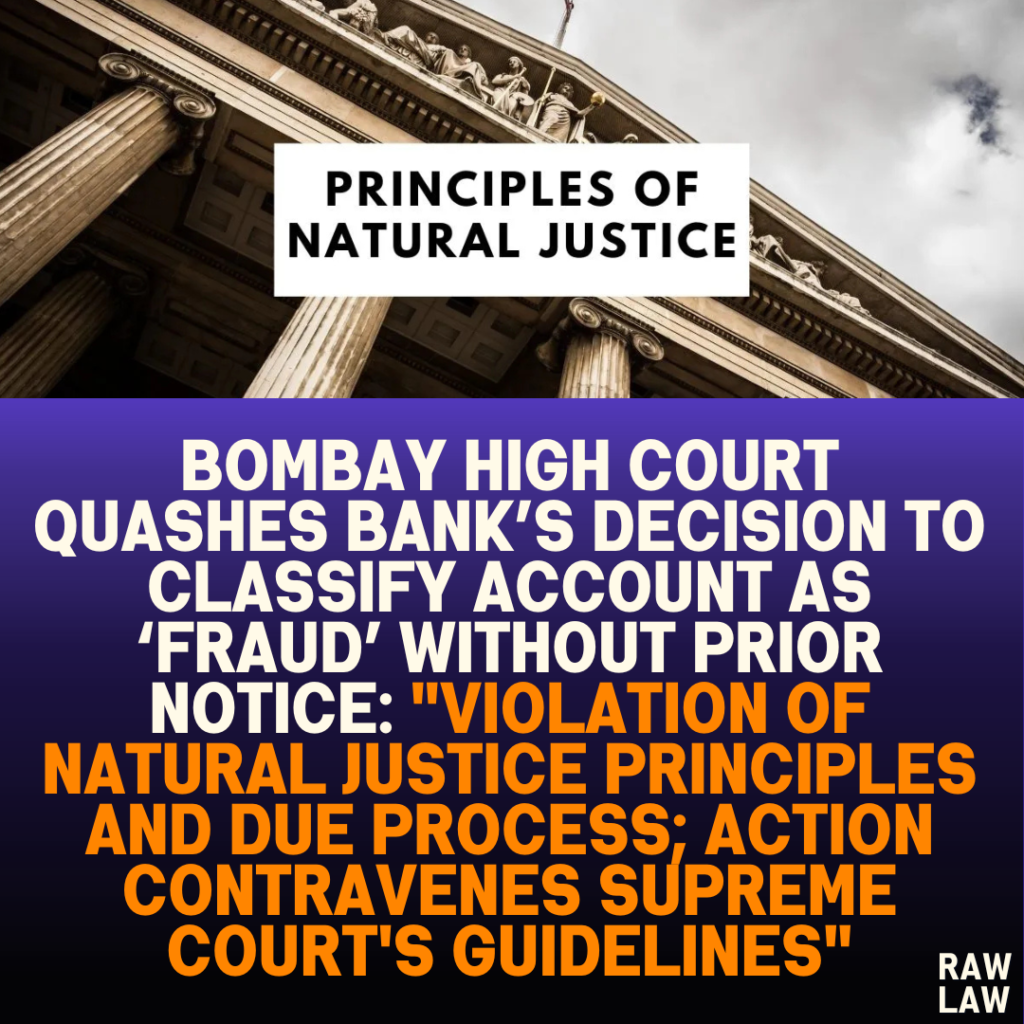Court’s Decision
The Bombay High Court quashed the decision of the Respondent-Bank to categorize the Petitioner’s account as a “fraud” without issuing a show cause notice. The Court held that the Bank’s actions were contrary to the law laid down by the Supreme Court in the case of State Bank of India and Ors. v. Rajesh Agarwal and Ors. [(2023) 6 SCC 1]. Additionally, the Court noted that the entire dues of the Respondent-Bank had been settled under a One-Time Settlement (OTS) agreement, and a No Dues Certificate had been issued. As a result, the Writ Petition was allowed, and the bank’s decision was declared null and void.
Facts
The Petitioner filed the Writ Petition challenging the Bank’s actions in declaring its account as a “fraud” account. The Petitioner argued that no prior intimation or show cause notice was provided, and they were verbally informed of the categorization. The account was classified as “fraud” on August 21, 2019, and the Petitioner claimed that no formal communication was made until the issue was raised in this petition. Furthermore, the Petitioner contended that all dues had been settled as per the terms of the OTS sanctioned on March 21, 2024, with the entire payment made as per Consent Terms filed before the NCLAT.
Issues
- Whether the action of the Respondent-Bank in declaring the Petitioner’s account as “fraud” without issuing a show cause notice is legally valid.
- Whether the subsequent One-Time Settlement (OTS) and the issuance of the No Dues Certificate nullify the classification of the account as “fraud.”
Petitioner’s Arguments
The Petitioner argued that the action of the Respondent-Bank was arbitrary and violative of the principles of natural justice as no show cause notice was issued before declaring the account as a “fraud.” It was also contended that the categorization was done without following the due process and in complete disregard to the law laid down by the Supreme Court. The Petitioner further highlighted that the entire dues had been paid, and a No Dues Certificate had been issued.
Respondent’s Arguments
The Respondent-Bank, on receiving telephonic instructions, admitted that no show cause notice had been issued before declaring the Petitioner’s account as “fraud.” The Bank also confirmed that the classification was made on August 21, 2019, and acknowledged that the entire payment was received under the OTS. However, the Respondent maintained that the classification was made in accordance with their internal policies.
Analysis of the Law
The Court analyzed the principles of natural justice and the requirement of issuing a show cause notice before taking adverse action against any party. Referring to the Supreme Court’s ruling in State Bank of India v. Rajesh Agarwal, the Court emphasized that declaring an account as “fraud” without giving the affected party an opportunity to be heard is a violation of the procedural safeguards mandated by law. The Court also noted that once a No Dues Certificate is issued, any subsequent action based on the previous status of the account is unsustainable in law.
Precedent Analysis
The Court relied heavily on the precedent set in State Bank of India v. Rajesh Agarwal, where the Supreme Court categorically held that a show cause notice is a prerequisite before declaring an account as “fraud.” This precedent was applied to underscore the invalidity of the Respondent-Bank’s action in the present case.
Court’s Reasoning
The Court found that the Respondent-Bank’s actions were in violation of the principles of natural justice. The absence of a show cause notice before classifying the Petitioner’s account as “fraud” rendered the action null and void. Additionally, since the entire dues were settled under the OTS, the issuance of the No Dues Certificate further validated that no pending liability existed against the Petitioner.
Conclusion
The Court quashed the decision of the Respondent-Bank to classify the account as “fraud” and allowed the Writ Petition in terms of the relief sought. It declared the Bank’s actions, as well as any blacklisting of the Petitioner, null and void. The Court directed that any communication or record categorizing the Petitioner’s account as “fraud” should be withdrawn.
Implications
This decision reiterates the importance of following due process before taking adverse actions against borrowers, especially in the context of declaring accounts as “fraud.” The judgment reinforces the mandate for issuing show cause notices and providing an opportunity to be heard before any such classification is made. It also underscores that once a No Dues Certificate is issued, any classification based on the previous status is unsustainable.
This ruling serves as a reminder to financial institutions to adhere to procedural safeguards and respect the principles of natural justice when dealing with borrowers.
